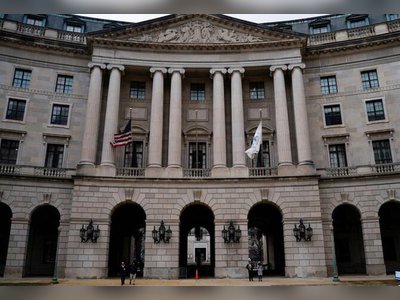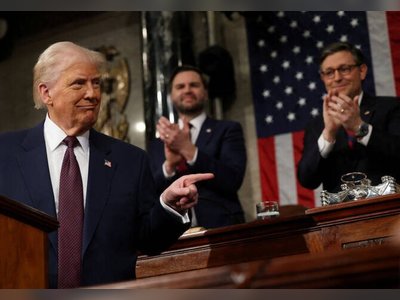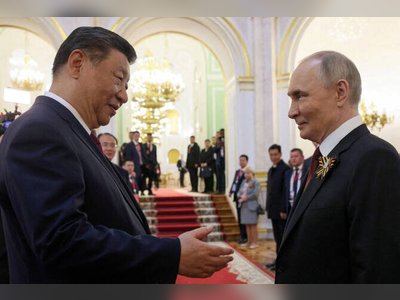
US Court Rules Tariffs Illegally Imposed but Leaves Them in Place for Now
Appeals court upholds lower court's decision, but allows tariffs to remain until appeal to Supreme Court.
In a significant ruling on Friday, the US Court of Appeals for the Federal Circuit upheld a lower court's decision that President Donald Trump lacked legal authority to impose sweeping tariffs.
However, instead of immediately revoking the tariffs, the court allowed them to remain in place temporarily, allowing for an appeal to the Supreme Court.The court's 7-4 decision largely agreed with a May ruling by a specialized federal trade court in New York, which found that Trump had no legal right under the International Emergency Economic Powers Act (IEEPA) to declare national emergencies and impose import taxes on nearly every country.
The tariffs, intended to protect the US economy from foreign competition, have been a cornerstone of Trump's trade policy.The ruling complicates Trump's efforts to reshape American trade policies unilaterally.
Although alternative legal avenues exist for imposing import taxes, they would limit the speed and severity with which he can act.
The tariffs have already caused market instability, strained relationships with trading partners, and raised concerns about economic growth and higher prices.Despite the ruling, the government argued that if the tariffs were overturned, it might be required to refund some of the import taxes collected, potentially causing financial losses for the US Treasury.
Revenue from these tariffs has amounted to over $142 billion by July, more than double the figure from the previous year.The case involves two sets of tariffs imposed by Trump: a broad set targeting countries with which the US runs trade deficits and an additional set targeting imports from Canada, China, and Mexico intended to address drug trafficking and immigration issues.
The Constitution grants Congress authority over taxation, including tariffs, though over time, this power has been partially delegated to the President.Trump's assertion of emergency powers under IEEPA was challenged in at least seven legal cases, with critics arguing that neither a persistent trade deficit nor the threats it poses could justify declaring an emergency under the law.
The Trump administration cited previous court approvals, including during the 1971 economic crisis sparked by President Richard Nixon's decision to end the linking of the US dollar to gold prices.The ruling does not affect other tariffs imposed by Trump, such as those on foreign steel and aluminum or the ongoing tariffs against China, which were continued under President Joe Biden.
Alternative sections of trade law do provide Trump with some authority to impose import taxes, although these are more limited in scope and duration.
However, instead of immediately revoking the tariffs, the court allowed them to remain in place temporarily, allowing for an appeal to the Supreme Court.The court's 7-4 decision largely agreed with a May ruling by a specialized federal trade court in New York, which found that Trump had no legal right under the International Emergency Economic Powers Act (IEEPA) to declare national emergencies and impose import taxes on nearly every country.
The tariffs, intended to protect the US economy from foreign competition, have been a cornerstone of Trump's trade policy.The ruling complicates Trump's efforts to reshape American trade policies unilaterally.
Although alternative legal avenues exist for imposing import taxes, they would limit the speed and severity with which he can act.
The tariffs have already caused market instability, strained relationships with trading partners, and raised concerns about economic growth and higher prices.Despite the ruling, the government argued that if the tariffs were overturned, it might be required to refund some of the import taxes collected, potentially causing financial losses for the US Treasury.
Revenue from these tariffs has amounted to over $142 billion by July, more than double the figure from the previous year.The case involves two sets of tariffs imposed by Trump: a broad set targeting countries with which the US runs trade deficits and an additional set targeting imports from Canada, China, and Mexico intended to address drug trafficking and immigration issues.
The Constitution grants Congress authority over taxation, including tariffs, though over time, this power has been partially delegated to the President.Trump's assertion of emergency powers under IEEPA was challenged in at least seven legal cases, with critics arguing that neither a persistent trade deficit nor the threats it poses could justify declaring an emergency under the law.
The Trump administration cited previous court approvals, including during the 1971 economic crisis sparked by President Richard Nixon's decision to end the linking of the US dollar to gold prices.The ruling does not affect other tariffs imposed by Trump, such as those on foreign steel and aluminum or the ongoing tariffs against China, which were continued under President Joe Biden.
Alternative sections of trade law do provide Trump with some authority to impose import taxes, although these are more limited in scope and duration.










